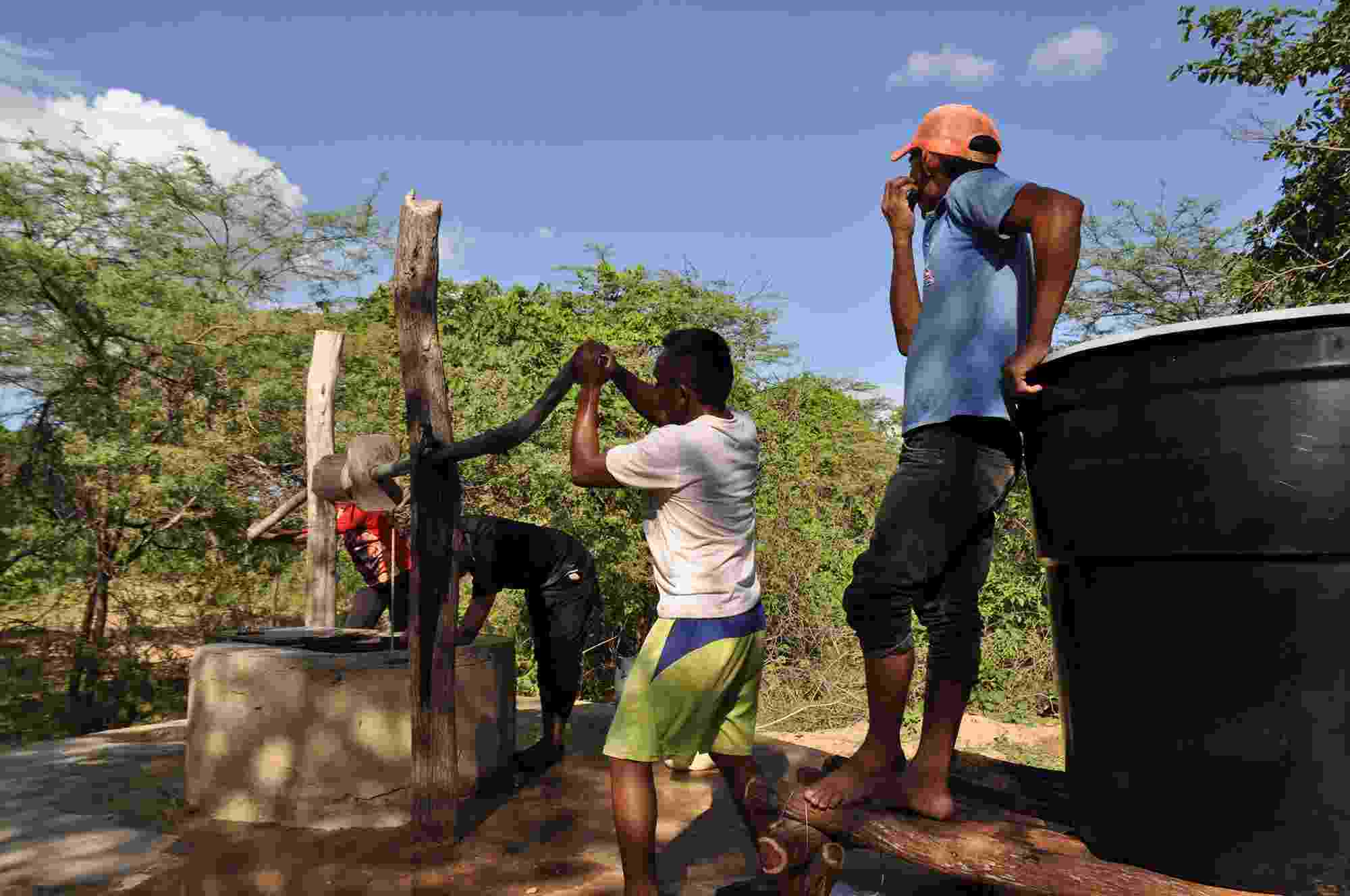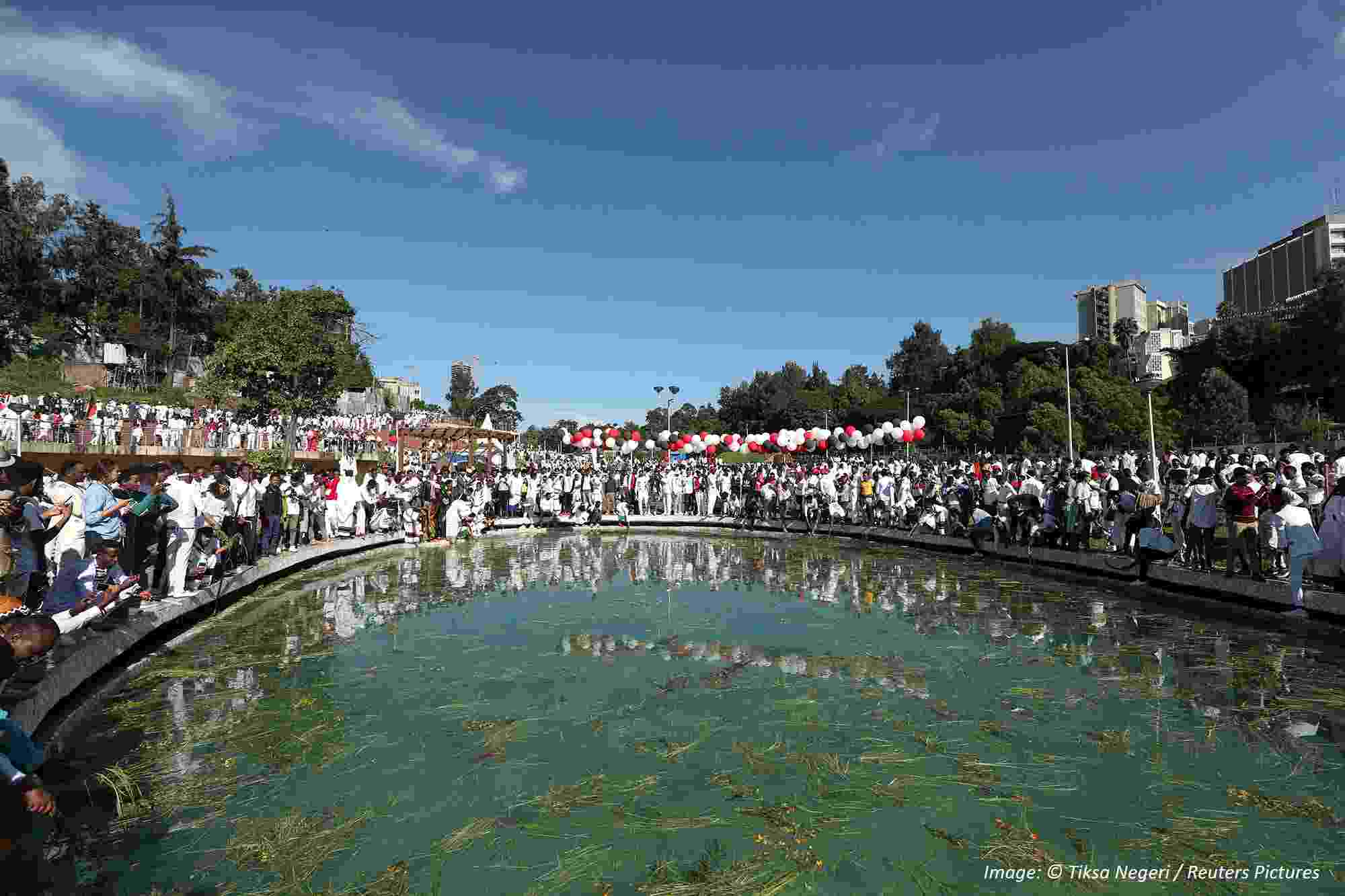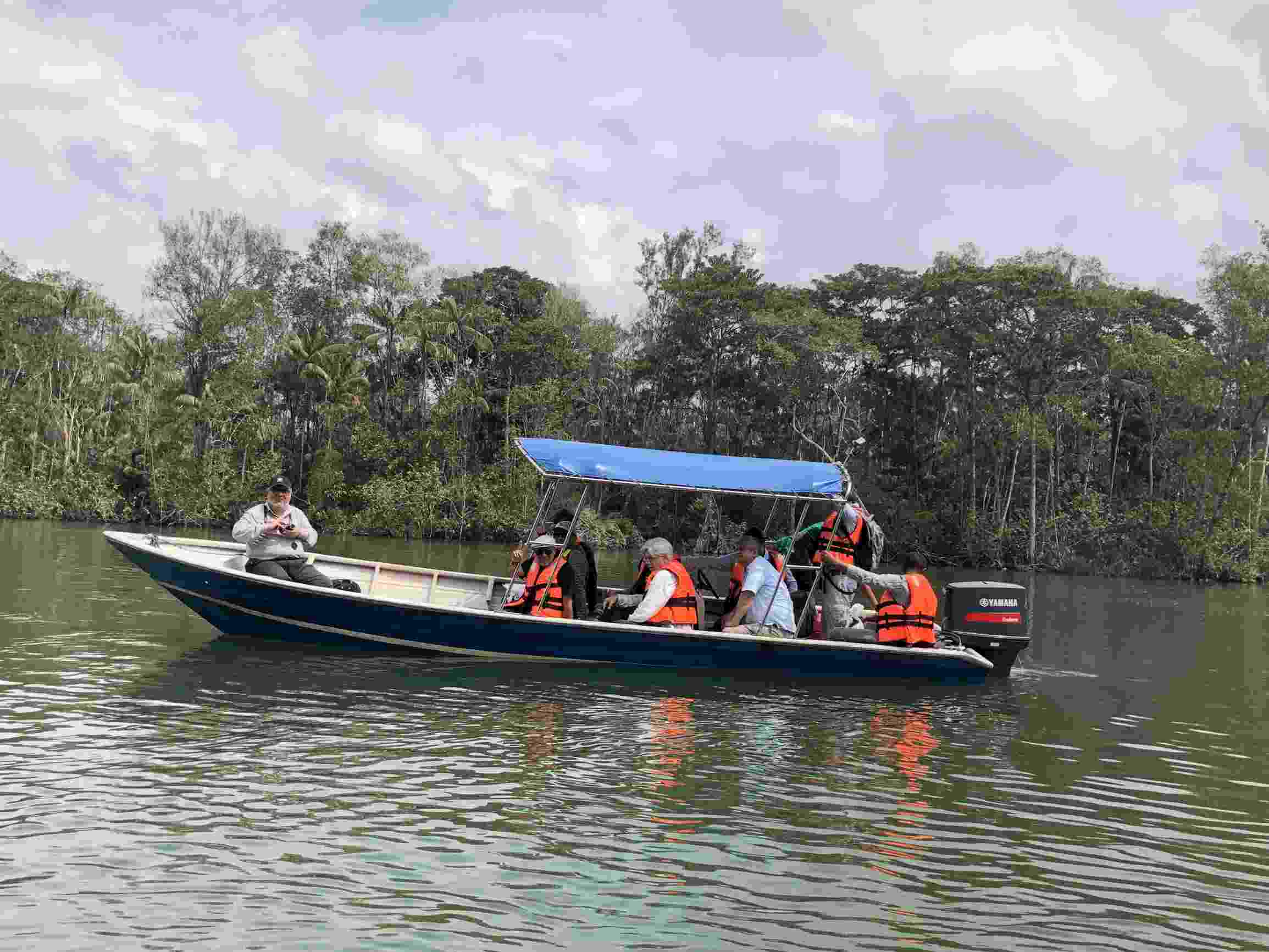Researching and understanding water values
If you are researching water, how do you decide where to focus or which measurements to take?
22 March 2021
Water values
The issue of values is enmeshed in all aspects of the Hub's work and made explicit in workstream 4, which responds to the need to realise the full social, economic, and environmental value of water security. Narrow analysis based upon economic supply‐demand does not capture the full value of water and the connections to issues of equity, justice, and human rights.
In this video, Dr Cat Button, workstream 4 co-lead, discusses the different ways in which values impact on the Hub's research programme and our understanding of water security - read our collaboratories responses below.


Wayuú Community members using a water well, La Guajira
Colombia
What does water mean to you? How do you value water? Values are complicated and multiple.
Water is the foundation of life for all beings, human and non-human. Water is the axis for socio-ecological processes including cultural, spiritual, symbolic, economic, and political activities. The restoration properties of water can be seen throughout a myriad of scales and systems as it hydrates the dehydrated, nourishes the undernourished, smooths the rough, cleans the polluted, and cools the sweltering. Water generates emotions; feelings of calmness, connectivity, joy, but also those of fear, anxiety, and worry. The untamed power of water reminds us that we as humans are not in control of nature; that we are susceptible to water’s ebbs and flows, as it transitions from propitious to perilous for our society.
There are justice issues in which values are prioritised.
Several types and levels of environmental injustices are evident in the Upper Cauca River Basin: distributive in terms of iniquities in access to water; and affectation by the pollutant load among different uses, users, territories, and other types of life.
The agricultural sector monopolizes 67% and 91% of the surface and subway water concessions, almost all of it for sugarcane cultivation. Thirteen percent of the users have 88% of the surface water allocated, and 40% of the users have 92% of the groundwater. In terms of pollution, the seven largest cities contribute 72% of the pollution load of the 83 municipalities of the CARC, and only two of them have WWTP, but with partial treatment.
In terms of procedural justice, there is limited participation of social actors in the design and construction of water governance policies. In terms of recognition of justice, there is a prioritization of the instrumental values of water, marginalizing other perceptions and worldviews of water. All these injustices generate great inequities and socio-environmental conflicts.
Values underpin our choices and also the decisions of policy makers.
At policy level, water policy decisions are driven by the country's economic and legal systems values, such as economic efficiency, justice and equity, development, or others.
At community levels, water choices and decisions are motivated by shared plural water values within a community, but always limited to the existing structures, such as water use practices, infrastructure, legal use frames, and others.
At micro levels, in people’s everyday life, values do not underpin decisions or choices related to water, at least when understood as people’s values. Individuals perform practices, a routinized and socially shared type of behaviour which possess their own logic and values. Therefore, most of the time, the value of water does not lie in the individual, but in the practice.


People sprinkle water on their body as they take part in the Irreecha celebration, the Oromo People thanksgiving ceremony in Addis Ababa
Ethiopia
What does water mean to you? How do you value water? Values are complicated and multiple.
Water values are contested as different stakeholders have different interests and policymakers prioritise their policy goals. Given the diversity in culture, religion, livelihood, and environment people live in, water has multiple values. It is a pillar of life: it cleans, heals, quenches. It is a beauty and intersects social boundaries.
Valuing water stems from how, when, where, and why people use it. The difference in access to water, time, spaces, level of education, and resources determines how we use water and therefore how we value it. Many water values are unquantifiable, and many are based on non-consumptive water uses. Water values are unitless or with units... this complicates valuing water.
There are justice issues in which values are prioritised.
In every tradition, there are ethics and law that shape how people behave in a way that is fair, equal, and balanced for everyone. But under the strain of increasing population pressure, increasing economic disparity, and impacts of climate change, maintaining these ethics is a very difficult task. Government policy in Ethiopia prioritises water for human beings, livestock, the environment, and the economy (in that order of importance). But water demand, use, and therefore its values are much more than this list; the water uses and values that are not on the priority lists suffer and are lost.
Values underpin our choices and the decisions of policymakers.
The Central Rift Valley is known for its interconnected terminal lakes (water system) involving lakes Ziway, Abyata, Shalla, and Langano. Lakes Abyata and Ziway are hydrologically interconnected and when Ziway water is high, due to runoff it receives from two major streams (Meki and Katar), it flows to Lake Abyata. The salinity of Lake Abyata (normally saline) is regulated through freshwater input upstream of Lake Ziway.
However, emerging industries, small-scale irrigation farms in upstream areas, and flower farms around Lake Ziway together abstract and consume so much water that the flow from Lake Ziway to Lake Abyata has declined. Consequently, Lake Abyata, which has great intrinsic and instrumental value, is drying up at the cost of using water for economic use (e.g. irrigation and industry).
Lake Abyata - an international site of great ecological value for fauna (e.g migratory birds) and flora, has lost a significant proportion of its size and is suffering from a change in its chemistry implying value conflicts beyond the water system. Despite the clear evidence of lost ecosystem services and water values, as well as unmet demand, public water institutions (regional states government) are pursuing further water abstraction, particularly for agriculture.


Boatmen of Varanasi
India
What does water mean to you? How do you value water? Values are complicated and multiple.
Values are contextual and vary from community to community, place to place, and time to time. When water is available in abundance, certain values are given less importance, whereas in areas experiencing water scarcity, certain values of water increase significantly. For instance, in desert areas where there is a lack of water and soaring temperatures, the value of water increases manifolds. These values are reflected in our plans, policies, and the water management done by the state.
There are justice issues in which values are prioritised.
Water values are considered in the domains of public, private, and common goods, and the approaches to these are different. The right to access a minimum quantity of water for the sustenance of livelihoods is decided on based on area and context, but equity and universal access to water is a priority consideration in the value judgement of water.
Values underpin our choices and also the decisions of policy makers.
Values are the beliefs of people, society, and communities, and guide each on their actions. They also guide organisational leaders and policy makers. The significance of a water value is dependent on the values held within the governance structure, and in plans and policies, but the implementation of plans and policies depends on the values which are held by communities and individuals. A better understanding of the values of different people is needed, as the choices made by people and communities are important in implementing plans and policies.


Hub members on the Johor River
Malaysia
What does water mean to you? How do you value water? Values are complicated and multiple.
Water values are multifaceted. Valuing water can be complicated, inclusive of social, economic and environmental aspects. In economic terms, water value correlates with pricing, uses, and allocation among the communities, with variations in supply and demand from water-scarce areas to water rich areas. Not limited to just the economic value of water, from a social perspective water values are linked to the social-cultural practices of the community and stakeholders in the Johor River Basin. Communities worship and appreciate water and how much it contributes to their livelihood. Finally, the value of water is inseparable from the environment as it is a natural resource, and water quality deterioration can have a great impact on the environment.
Understanding that water has plural values, in both direct and indirect ways, is an effective evaluation tool in valuing water to assist transparent and informed decision making.
There are justice issues in which values are prioritised.
Water is valued based on its contribution to ecosystem and economic services. Decisions made on water management follow a multi-criteria process including the consideration of conflicting value systems and political power dynamics.
In the Johor River Basin, barrage development has supported the generation of freshwater for portable water and other activities, by controlling and stabilising flows of river water and seawater. This could, however, impact local fishermen with a loss of income due to water desalination subsequently affecting the fish population. As the local fishermen are a small group compared to other water users, the construction of barrages is permitted.
Multiple values need to be expressed and recognised. Decision makers could refer to using a mechanism for valuing water that presents criteria on a scale, using a cost-benefit analysis approach for the ecosystem services generated from water, against contemplating trade-offs in order to find best practice.
Values underpin our choices and also the decisions of policy makers.
Water users include different stakeholders and communities that hold varied perceptions, meaning the values of water can be diverse.
Given the strategic location of the Johor River, government agencies value water as a source of income for the country by supplying freshwater to Singapore. Alternatively, fishermen appreciate the river as their source of income; villagers use the river for transportation; tourists come to appreciate the historical, religious, and socio-cultural values of the Basin; and industry stakeholders in palm and poultry farming need water for production.
Understanding these multiple and diverse values, through methods such as citizen participation and stakeholder discussion, is vital for effective policy decision making and implementation.



